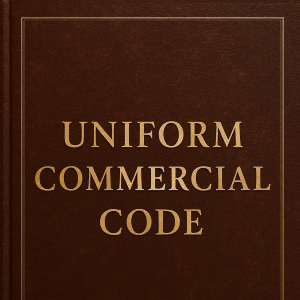Understanding the Uniform Commercial Code (UCC): A Guide for Businesses
Uniform Commercial Code (UCC) standardizes commercial transactions across all states. Learn how it governs sales, leases, secured transactions, and more for businesses in the USA. Explore the history of the UCC, from its creation in 1952 to modern updates. Learn how the UCC standardized commercial transactions across all U.S. states.
📌 What Is the UCC?
UCC is a comprehensive set of laws governing commercial transactions in the United States. It standardizes business practices across states, providing consistency and legal certainty for merchants, lenders, and consumers.
UCC is a uniform law adopted by all 50 U.S. states, the District of Columbia, and U.S. territories. First published in 1952 and regularly updated, the UCC governs transactions involving:
- Sale of goods
- Leases of goods
- Commercial paper (checks, promissory notes)
- Bank deposits and collections
- Letters of credit
- Secured transactions
✅ UCC provides a standardized legal framework to ensure smooth and predictable commercial transactions across the United States.
📌 Key Articles of the UCC
The UCC is divided into 11 articles, each addressing specific areas of commercial law:
- Article 1 – General Provisions: Basic rules and definitions.
- Article 2 – Sales: Governs the sale of goods.
- Article 2A – Leases: Rules for leasing goods.
- Article 3 – Negotiable Instruments: Covers checks and promissory notes.
- Article 4 – Bank Deposits and Collections: Banking transactions.
- Article 4A – Funds Transfers: Electronic funds transfers.
- Article 5 – Letters of Credit: Trade finance instruments.
- Article 6 – Bulk Transfers: Sale of business inventory.
- Article 7 – Warehouse Receipts & Bills of Lading: Storage and shipping documents.
- Article 8 – Investment Securities: Securities transfers.
- Article 9 – Secured Transactions: Collateralized lending and credit.
📌 Why the UCC Is Important
- Uniformity Across States: Provides consistent rules for businesses operating in multiple states.
- Legal Certainty: Reduces disputes by defining rights and responsibilities in transactions.
- Facilitates Trade: Simplifies commercial transactions and supports economic activity.
- Protects Parties: Establishes clear rules for buyers, sellers, lenders, and borrowers.
📊 For example, Article 2 ensures that contracts for the sale of goods are enforceable nationwide, making interstate commerce smoother.
📌 UCC in Practice
Businesses rely on the UCC for contracts, sales agreements, financing, and trade. Legal counsel often references the UCC when resolving disputes or drafting contracts to ensure compliance and reduce risk.
The History of the UCC: Key Milestones
UCC is the foundation of commercial law in the United States. Its development and adoption have provided legal consistency for businesses, banks, and consumers nationwide.
📌 Origins of the UCC (1940s–1952)
- 1940s: The need for uniform commercial laws across U.S. states becomes clear, as variations caused legal uncertainty in interstate commerce.
- 1952: The first edition of the UCC is published by the National Conference of Commissioners on Uniform State Laws (NCCUSL) and the American Law Institute (ALI).
- Goal: Standardize commercial transactions and provide clear rules for sales, negotiable instruments, and banking.
✅ The UCC was first published in 1952 to standardize commercial transactions across all U.S. states.
📌 Early Adoption and Growth (1950s–1970s)
- 1950s–1960s: States begin gradually adopting UCC provisions.
- 1960s–1970s: Major revisions to Articles 2 (Sales), 3 (Negotiable Instruments), and 9 (Secured Transactions) improve clarity and uniformity.
- 1972: Article 2A introduced, covering leases of goods, reflecting the growing importance of leasing in business.
📊 These early revisions made the UCC a practical tool for commerce and legal practice.
📌 Modern Updates (1980s–Present)
- 1980s–1990s: Electronic commerce and banking innovations lead to updates in Articles 4A (Funds Transfers) and 4 (Bank Deposits).
- 2000s: Minor amendments address emerging business practices and technology-driven transactions.
- 2010s–2020s: Article 9 continues to evolve to accommodate modern secured transactions and digital assets.
✅ The UCC has been updated regularly to address modern commerce, including electronic transactions, banking, and secured lending.
📌 Why the UCC’s History Matters
- Legal Uniformity: Provides consistent commercial rules across all U.S. states.
- Business Confidence: Businesses rely on the UCC for contracts, financing, and dispute resolution.
- Economic Efficiency: Facilitates smooth interstate commerce and reduces legal uncertainty.
- Adaptability: Continues to evolve with changes in technology and business practices.
🔎 Quick Answers
When was the UCC established?
UCC was first published in 1952 to standardize commercial transactions across all states in the United States.
What is the UCC?
UCC is a set of standardized laws governing commercial transactions across all U.S. states, covering sales, leases, secured transactions, negotiable instruments, and banking.
✅ Conclusion
Uniform Commercial Code is a cornerstone of American business law. By standardizing rules for sales, financing, and commercial transactions, the UCC promotes legal certainty, efficiency, and fairness in U.S. commerce. UCC has transformed U.S. business law since its creation in 1952. Its adoption and continual updates ensure that commercial transactions remain consistent, efficient, and legally secure, supporting economic growth across the nation. For more information and the full text of UCC, you can visit Cornell Law Scholl’s official web site. Please also feel free to contact us on any business issue and our services, With over 25 years of expertise, knowledge, and experience in Business Law, we are here to help you. Additionally, you can explore the books of our Founder, Dr. Soner Altaş, in the field of Commercial Law, or take a closer look at Tacirsoft Legal Information System — Turkey’s first and only legal database dedicated to Turkish Corporate Law and Organized Industrial Zones Law.


